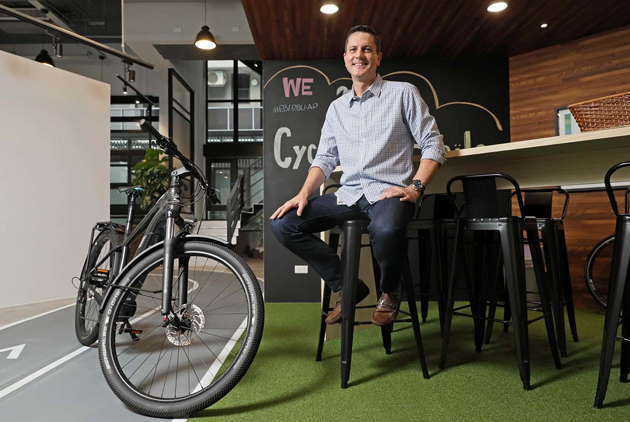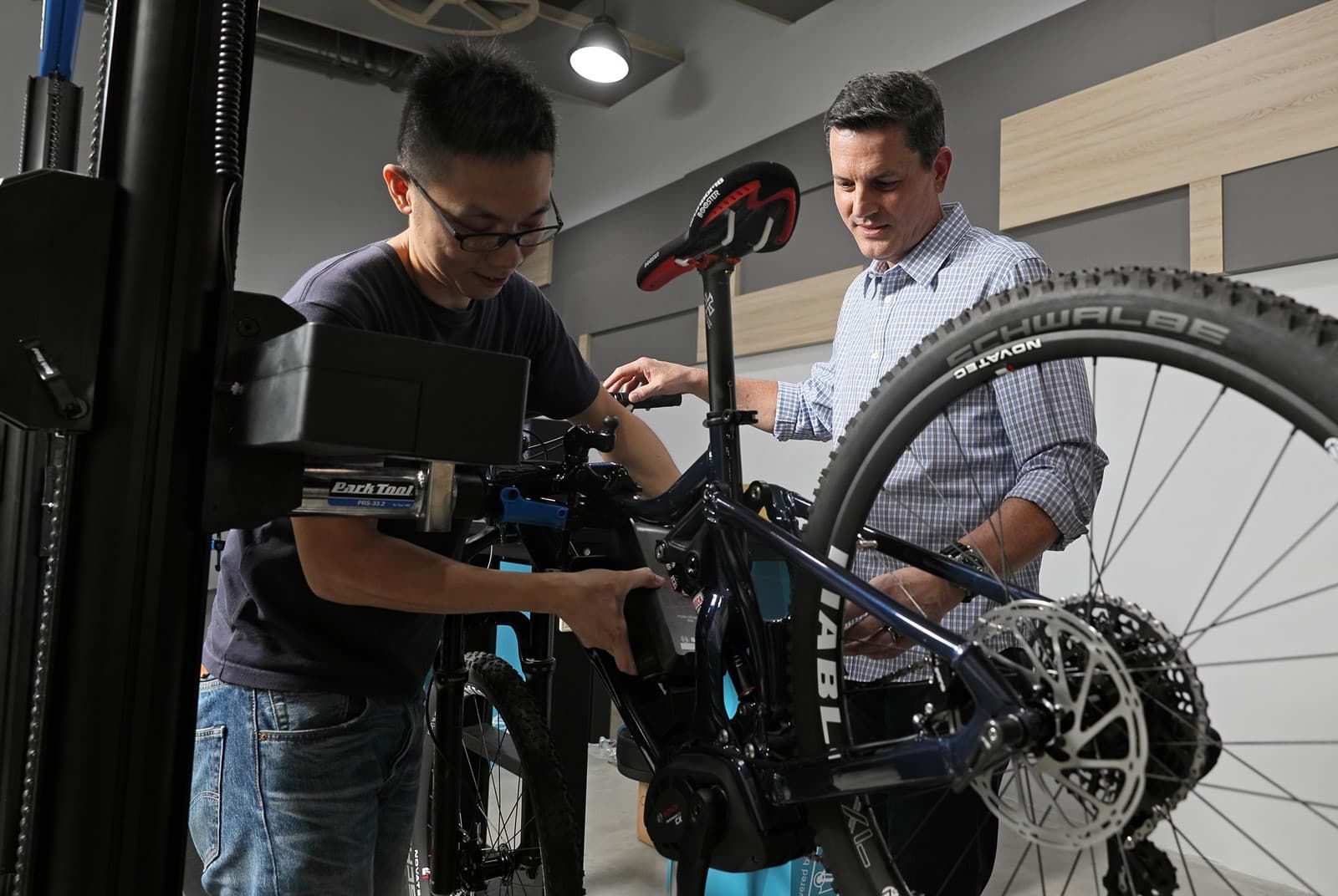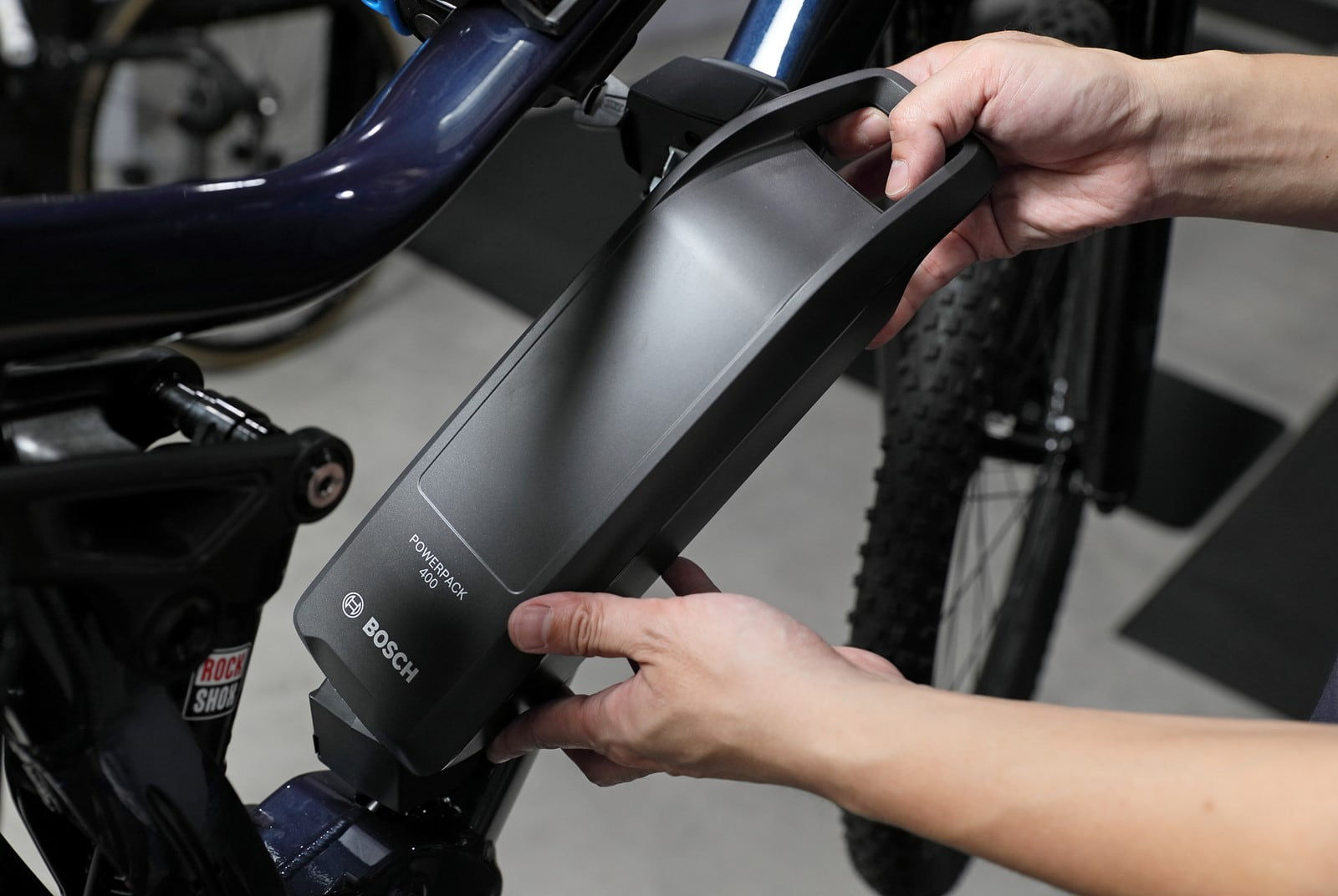Why Bosch Set Up its eBike Asia Pacific HQ in Taiwan

Source:Chien-Tong Wang
Electric bicycles are selling like hotcakes around the globe. So why is Bosch e-Bike Systems, which supplies half of all e-bike motors worldwide, setting up its Asia-Pacific headquarters from China’s Suzhou to Taichung in central Taiwan?
Views
Why Bosch Set Up its eBike Asia Pacific HQ in Taiwan
By Ching Fang Wuweb only
Over 20 years ago, Taiwanese bicycle manufacturer Merida Industry Ltd. decided to develop an electric bicycle, a pioneering move in the local bicycle industry at the time. The bold move was not successful, and the company eventually had to scrap an entire production line. Merida’s failure drummed home the message to the entire industry that making high-end bicycles and making electric motors are two different things.
The electric system is the heart of an e-bike because it powers the bicycle. It requires technologies that have nothing to do with conventional bicycle manufacturing.
Yet amid the COVID-19 pandemic, Merida put on a stellar performance with an EPS of NT$9.75 for the first three quarters of 2020, thanks to booming sales of e-bikes, the product that once cost it dearly. Electric bikes accounted for 50 percent of all sales, and order books are full until the end of 2021.
Bosch eBike Systems, which belongs to German multinational engineering and tech conglomerate Robert Bosch GmbH, also known as Bosch, played a key role in persuading Merida to give e-bikes another try.
Founded in 1886, Bosch is an established global supplier of spare auto parts, transmission and control systems, home appliances, power tools, and electromechanical devices. The company ventured into the field of e-bike systems only 10 years ago and now provides a complete solution comprising battery and electric motor.
Nearly half of all e-bikes around the world are equipped with the Bosch e-bike system
In June of 2020, Bosch eBike Systems formally opened its Asia-Pacific headquarters in Taiwan.
“We need the Taiwanese bike industry…Taiwan is still the hub [of global bicycle manufacturing],” notes David Howard, vice president and general manager of Bosch eBike Systems Asia Pacific. The new headquarters in the Nantun District of Taichung still has the typical smell of a newly decorated office.
The Bosch eBike Systems Asia Pacific team was originally based in Suzhou of Jiangsu Province. The decision to set up its headquarters had to do with the evolving geopolitical situation, Howard said.

In 2019, the European Union, the largest e-bike market, began to impose anti-dumping duties of up to 79.3% on bicycle imports from China. This effectively put an end to Chinese bicycle exports to the EU. At the same time, the trade war between the US and China affected the sales of Bosch e-bikes in the U.S. Against this backdrop, going to Taiwan seemed to be the best option, indeed the only option.
Howard notes that although bicycle exports from Southeast Asia are increasing, the manufacturers behind these production bases are still from Taiwan. "So even in Vietnam, the biggest frame company there is Taiwanese-owned,” Howard points out.
Taiwan is Indispensable for Serving the Asia-Pacific market
Howard concedes that generally the European model of trying to supply as close to the market as possible is always a good supply chain strategy. Yet when it comes to bike drives, "the production location for me is secondary to the engineering side....but bicycle engineering competence is sitting here in Taiwan,” says Howard in explaining his choice of location. No matter where in Europe these bicycles are assembled, their parts and components are still designed and developed by Taiwanese. Therefore, Bosch eBike Systems needed to move its Asia-Pacific headquarters to Taiwan.
Taiwan was also selected because the next pedelec boom is expected to happen in the Asia-Pacific region.
The manufacturers Howard works with not only do business in Europe but also export to North America, Japan, South Korea and Oceania. On top of that, bicycle sales have skyrocketed worldwide as commuters avoid taking public transport amid the COVID-19 pandemic. Aside from Merida and Giant, which mainly produce their own brand bikes, most other Taiwanese bicycle manufacturers fill orders from international brands, yet, despite full capacity, production demand outstrips supply everywhere in the world.
In Oceania in the southern hemisphere, which is now entering summer, the bike shortage is particularly severe. “I think this is probably the case for most of the bikes that we're having built here; they’re sold long before they land in the shop,” says Howard.
Early on, market insiders rumored that customers who failed to order Bosch motors before March of 2020 would have to wait a whole year. Jumping the queue is impossible as all bicycle makers are desperate to get their hands on the motors. Some companies reportedly face delivery periods of up to 500 days.
Pedelecs are not only selling better and better, but new battery and motor models keep coming out too. Bicycle types are becoming more refined and diverse, so Bosch needs to collaborate closely with Taiwan’s bike industry cluster.
“The trend in e-bikes, especially the so-called mid-drive, not in the hub style, is design integration, smaller drive units, smaller batteries, or actually integrated into the product. So your e-bike doesn't look like an e-bike,” explains Howard. The most important job of the Asia-Pacific headquarters is to coordinate the drive system development with the development of the customers’ designs.

Most crucial is the collaboration between Bosch and the bike manufacturers in the early stage of development.
For a conventional bicycle, it takes about three to six months from design to market, but it takes 18 months to develop an e-bike and bring it to market. In Europe, each e-bike model must obtain EU certification, and with each minor design change a new round of certification is required.
“Bosch is the leader (in e-bikes); the bicycle industry follows their lead,” notes Merida Senior Vice President and Spokesman William Jeng (鄭文祥). Bosch concentrates on electric bicycle systems and does not make entire bicycles, thus avoiding direct competition with its customers. The company maintains flexibility by cooperating with all manufacturers to expand the market together.
The E-Bike Pie is Getting Bigger
In the past, the bestseller among the electric bicycles were mountain bikes. But with the pandemic the market has changed dramatically, so that now electrical versions of all traditional bike types are marketable.
Due to the pandemic, the former niche product pedelec has become a daily necessity in the mass market.
Urban consumers might be more inclined to buy an e-bike than a car. As a result, many bike models that were unthinkable in the industry just three or five years ago are now making their debut.
Howard cites as an example a light-weight electric mountain bike that is currently selling extremely well. Although the bike has the typical mountain bike appearance, consumers are not buying it to tackle hilly terrain but to commute in the city.
Howard likens the bikes to “a nice SUV that never sees the dirt.” “And cargo bikes are just exploding...they are really popular not just in Europe, but also in the U.S. And they’re selling like crazy in Australia,” exclaims Howard. Even foldable bikes are now available as pedelecs.
Although the market is hot right now, Bosch is already mulling the next step.
Smart technology and AIoT (AI and the Internet of Things), where Bosch has plenty of expertise, will be part of e-bikes. The automatic braking systems known from the Internet of vehicles could be also introduced. Howard expects the bikes of the future to be very different from today. “There's so many options with connected biking, which is really the next frontier for e-bikes,” he said.
Have you read?
♦ Gogoro’s EV Dream Facing Major Headwinds
♦ Why Bike to Work? Benefits for Cyclists Around the World
♦ As Lockdowns Ease, This MIT Product is Spinning Away
Translated by Susanne Ganz
Edited by TC Lin
Uploaded by Penny Chiang






